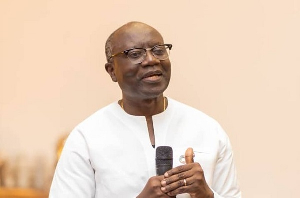By Frank S. Debrah
The year is 2000. Ghana, a developing country but one said to be relatively better governed, is burdened with unsustainable levels of foreign debt. Its external debt stock stands at 126% of gross national income (total debt owed to foreigners, repayable in foreign currency). The debt has been accrued through years of borrowing from international financial institutions ostensibly for national development purposes. However, the loans have not resulted to significant economic expansion as the income and living standard of the average Ghanaian has not appreciated much since independence.
Where did the money go? Part of it may have been used for productive activities but a bulk of it went into sustaining an elaborate patronage system that solidified the political fortunes of incompetent regimes. Corruption has always been problematic so there is a high degree of certainty that proceeds of the loans ended up building private mansions for the ruling elites.
Now the country is saddled with mountains of debt and is being held hostage by debt-service commitments to foreign lenders. Rather than building schools, hospitals, roads and electricity grids, the government is allocating chunks of revenue to service the interest on the crippling national debt. This was Ghana’s experience at the beginning of the millennium when others were celebrating an era of economic freedom.
What to do? Ever so cunning, our political elites saw an opportunity in international movements, like the Jubilee 2000 Campaign, that were on a global ‘jihad’ to shame Western governments and international financial institutions into dropping the debt of poor states. Because of guilt or pressure, the international financial institutions succumbed. This paved the way for Ghana’s gigantic debt to be viewed and treated as if it was some kind of a ‘natural disaster’ that just happened to befall the country.
Like all natural disasters, the response from the West was akin to ‘humanitarian assistance’ – a financial bailout called Highly Impoverished Poor Countries (HIPC) initiative. A pet program of the World Bank and the IMF, HIPC provided debt forgiveness to poor countries that were said to have ‘good policies’ and practiced ‘good governance’; technocratic speech for countries with policies mirroring the West and whose leadership did not steal nearly as much money as Mobutu or Abacha.
Rhetorically, HIPC was designed to free Ghana from the shackles of debt obligations so that the government can re-divert resources from debt service to development projects and poverty alleviation programs. By 2006, Ghana’s foreign debt had nearly been wiped out clean, dropping to 16.4% of GNI from 126.6% in 2000.
While I supported debt relief for Ghana and still do, it is important to point out that debt relief creates a moral hazard. Countries whose debts are forgiven have the tendency to return to the same bad behaviour that put them in debt in the first place. In other words, they tend to borrow more money and accrue new debt to replace the forgiven debt.
Sadly, we are beginning to see evidence of this moral hazard in Ghana. After debt relief in 2006, the country’s external debt has returned to a steady climb; rising from 16.4% of GNI in 2006 to 19.8% in 2007, 24.5% in 2009 to 27.2% in 2010 (World Bank data). The latest figures from the Ministry of Finance place Ghana’s total debt in 2011 to 44.2% of GDP.
Critics and citizens have expressed concern about Ghana’s fiscal development but the current government maintains that there is no cause for alarm. For example, the Deputy Finance Minister, Mr. Fiifi Kwetey and other high-ranking state officials, have responded on the record that Ghana still maintains a fiscal space to borrow more. Point taken, technically we are still within the 60% GDP ratio thought by most economists to be sustainable. Nonetheless, it is the trajectory of new debt accumulation that has some of us worried.
Is our worry unjustified? Most certainly not! We are a country that has a high propensity to go binge borrowing without having much to show for it afterwards, except the lingering principal and the ever accruing interest rates. Debt is not a natural disaster that happens to strike us. Historically, we have been willing to mortgage the welfare of future generations to fund the current generation’s (mainly the corrupt clients of the ruling government) standard of living. These kinds of irresponsible behaviour ought to stop if Ghana is to turn the tide on financial mismanagement.
We must ensure that debt relief does not become a licence for new and irresponsible borrowing. A heavier debt load will increase government deficits by increasing interest cost on the debt therefore we must strive to cut our coat according to our size. This being an election year, the government must resist pressures to over-borrow and over-spend in order to hoodwink Ghanaians.
Loans have been made and have been forgiven all in the name of the poor citizens of Ghana, but those poor folks are not helped if debt forgiveness creates incentives for irresponsible administrations to over borrow. I am sharing my concern at this moment in time because stability and absence of crisis encourage risk taking, complacency and lowered awareness of the possibility of problems in the future.
Given the prevailing global economic paradigm, debt forgiveness is likely to be a one-time policy prescription and unlikely to be offered again by donors. Prudent fiscal management is the new religion in North America and Europe. As Europe continues to find a way out of its own debt crisis and with the United States struggling with its national debt, I highly doubt that anybody will listen if Bono, Bob Geldoff or Jeffrey Sachs returns to Washington or London to talk about a new debt relief for Ghana or any country. Europeans have proven unwilling to bail out one of their own, Greece, without painful consequence for the average Greek. I doubt there will be any sympathy for an African country that was bailed out but found itself in trouble again.
As our elders say, a word to the wise is enough!
I invite you to join me on Facebook or e-mail me at fsd@sfu.ca
Opinions of Saturday, 25 February 2012
Columnist: Debrah, Frank S.


















